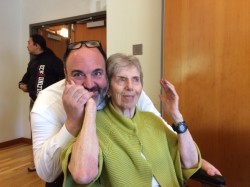Elder Abuse Awareness – Who is a Mandated Reporter?
It’s Elder Abuse Awareness Month – Who is a Mandated Reporter? June is Elder Abuse Awareness Month! With a Little Help will post a series of articles written by (or with a lot of help from) our friend and colleague, geriatric health specialist Karin Taifour, MA, LMHC, GMHS. WHO...





 Andrew Cohen, of
Andrew Cohen, of